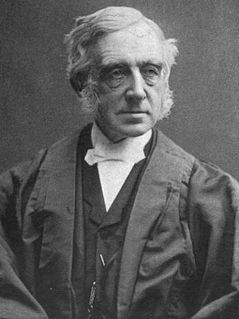A Quote by Ravi Zacharias
The Christian faith, simply stated, reminds us that our fundamental problem is not moral; rather, our fundamental problem is spiritual. It is not just that we are immoral, but that a moral life alone cannot bridge what separates us from God. Herein lies the cardinal difference between the moralizing religions and Jesus' offer to us. Jesus does not offer to make bad people good but to make dead people alive.
Quote Topics
Related Quotes
... we did decide to trust Christ, but the reason we made that decision is that God had first made us spiritually alive. ... God comes to us when we're spiritually dead, when we don't even realize our condition, and gives us the spiritual ability to see our plight and to see the solution in Christ. God comes all the way, not partway, to meet us in our need. When we were dead, He made us alive in Christ. And the first act of that new life is to turn in faith to Jesus.
What I'm most deeply grateful for is that God's love for us, approval of us, and commitment to us does not ride on our resolve but on Jesus' resolve for us. The gospel is the good news announcing Jesus' infallible devotion to us despite our inconsistent devotion to Him. The gospel is not a command to hang on to Jesus; it's a promise that no matter how weak and unsuccessful our faith and efforts may be, God is always holding on to us.
People say all the time 'I don't have a good testimony' because they think their story has to involve some dramatic story of change from 'bad' to 'good'. But Jesus didn't come to save people this way. Sin doesn't make us bad it makes us dead. Jesus came to save by bringing the dead to life. And that's an amazing testimony.
The gospel is saying that, what man cannot do in order to be accepted with God, this God Himself has done for us in the person of Jesus Christ. To be acceptable to God we must present to God a life of perfect and unceasing obedience to his will. The gospel declares that Jesus has done this for us. For God to be righteous he must deal with our sin. This also he has done for us in Jesus. The holy law of God was lived out perfectly for us by Christ, and its penalty was paid perfectly for us by Christ. The living and dying of Christ for us, and this alone is the basis of our acceptance with God
The mystery of the spiritual life is that Jesus desires to meet us in the seclusion of our own heart, to make his love known to us there, to free us from our fears, and to make our own deepest self known to us Each time you let the love of God penetrate deeper into your heart it leads to a love of ourselves that enables us to give whole-hearted love to our fellow human beings. In the seclusion of our hearts we learn to know the hidden presence of God; and with that spiritual knowledge we can lead a loving life.
The law of giving and receiving is fundamental, and relates just as much to God as it does to us. As we go through the door of giving ourselves to God in worship we find that God comes through that same door and gives Himself to us. God's insistence that we worship Him is not really a demand at all but an offer-an offer to share Himself with us. When God asks us to worship Him, He is asking us to fulfill the deepest longing in Himself, which is His passionate desire to give Himself to us. It is what Martin Luther called "the joyful exchange."
I believe that family is closer to God's heart than anything else, the support system he has given us to build us up in faith, and to support us when we falter. If we want our family lives to conform to God's will, Jesus must be our priority, our focal point, in our home as well as in our ministries.
That doesn't mean that it's always easy to live together: home can be the hardest place to live a Christian life. That's were people see us when we're tired and our defences are down.
Conscience, the sense of right, the power of perceiving moral distinctions, the power of discerning between justice and injustice, excellence and baseness, is the highest faculty given us by God, the whole foundation of our responsibility, and our sole capacity for religion. ...God, in giving us conscience, has implanted a principle within us which forbids us to prostrate ourselves before mere power, or to offer praise where we do not discover worth.
Let us pray for ourselves, that we may not lose the word “concern” out of our Christian vocabulary. Let us pray for our nation. Let us pray for those who have never known Jesus Christ and redeeming love, for moral forces everywhere, for our national leaders. Let prayer be our passion. Let prayer be our practice.
Only the gospel can truly save you. The gospel doesn't make good people good; it makes dead people alive. That's the difference between the gospel of Jesus Christ and every other world religion. All the others exhort their followers to save themselves by being good, by conforming their lives to whatever their worshiped deity is. But the gospel is God's acceptance of us based on what Christ has done, not on what we can do.
Now let us gather into one bouquet, from the King's garden, these seven fragrant flowers: Jesus the Son of God; Jesus our sin-bearer; Jesus the giver of eternal life; Jesus the keeper of our undying souls; Jesus the hearer of our prayers; Jesus the chastener who can turn crosses into crowns; and Jesus the wonder-worker who changes us into eternal likeness unto Himself! These flowers will keep sweet till heaven dawns.
My ethical naturalism sees us as facing the predicament of being social animals without evolved adaptations that make social life easy. The fundamental problem that sparks the ethical project lies in our limited responsiveness to one another. The only way we have to address that problem is through a representative, informed, and engaged conversation.
































